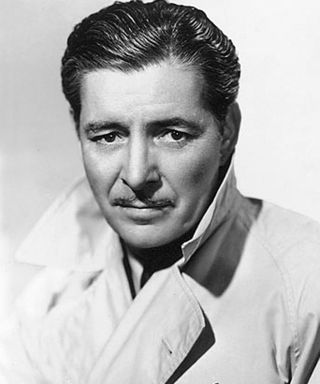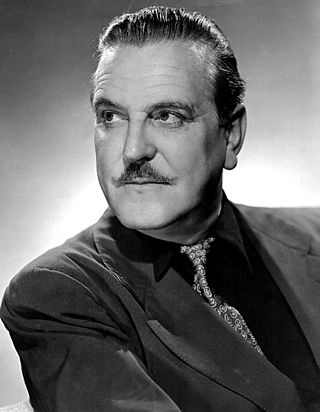Related Research Articles

Lights Out is an American old-time radio program devoted mostly to horror and the supernatural.
The Six Shooter is a United States Western old-time radio program starring James Stewart as a gunfighter. It was created by Frank Burt, who also wrote many of the episodes, and lasted only one season of 39 episodes on NBC. Initially, it was broadcast on Sundays at 9:30 pm Eastern Time, through October 11. Then it was heard at 8:30 pm for three weeks. Finally, on November 8, 1953, through March 21, 1954, it was broadcast Sundays at 8 pm; beginning April 1, 1954, through the final episode, it was on Thursdays at 8:30 pm. One old-time radio directory called the program "a last, desperate effort by a radio network (NBC) to maintain interest in adventure drama by employing a major Hollywood movie star in the leading role."
Candy Matson was a radio program on NBC West Coast that aired from June 29, 1949, to May 20, 1951. It centered on Candy Matson, a female private investigator with a wry sense of humor and a penthouse on Telegraph Hill in San Francisco. The program was notable for having a striking female character "without a trace of squeamishness" as well as a veiled gay character in Candy's best friend Rembrandt Watson, voiced by Jack Thomas. Candy's love interest was police detective Ray Mallard, voiced by Henry Leff. The announcer was Dudley Manlove. Actors frequently heard in minor roles were Helen Kleeb, John Grober, Mary Milford and Hal Burdick. In addition to the show being set in San Francisco, it was produced at San Francisco Radio City.
Starring Boris Karloff was an American radio and television anthology series broadcast for 13 weeks, September–December 1949, on the ABC Television network. Boris Karloff was the host and occasional star, with music by organist George Henninger. Produced and directed by Charles Warburton, the series adapted short stories of mystery and suspense.

Adopted Daughter was a radio soap opera in the United States. It premiered in 1937 on station WOW in Omaha, Nebraska, and moved to NBC's Midwest regional network in 1939. It was broadcast there five times a week for two years. The show was sponsored by J. C. Penney. Billboard magazine noted that the program was J.C. Penney's "first use of radio on a national basis." After 26 successful weeks on WOW, the program was carried on 16 stations via transcription.
Everyman's Theater is a 30-minute old-time radio dramatic series. Its 26 episodes were broadcast on NBC from October 4, 1940, through March 28, 1941.
Famous Jury Trials is a radio court show/dramatic anthology series in the United States. It began on January 5, 1936, and ended June 25, 1949. It is considered one of the first programs that initiated the court show genre, which later was broadcast on television as Famous Jury Trials.
Hollywood Star Playhouse is a radio dramatic anthology series in the United States. It was broadcast April 24, 1950-February 15, 1953, appearing on CBS, ABC and NBC over that span.

The Jack Smith Show was a radio program of popular music in the United States. It was broadcast on CBS Aug. 21, 1945-Dec. 26, 1952. It first originated from New York, but production was moved to Hollywood in 1948 to allow more opportunities for Smith to work in movies.
The Cresta Blanca Hollywood Players was a dramatic anthology radio series. It was broadcast on CBS September 3, 1946 – February 26, 1947.
Mayor of the Town is a radio comedy-drama in the United States. From September 6, 1942, to July 3, 1949, it was broadcast at various times on ABC, CBS, Mutual and NBC.
For the interview program of the same name, see Hollywood Star Time .
Stars over Hollywood is a radio anthology in the United States. It was broadcast on CBS from May 31, 1941, to September 25, 1954, sponsored first by Dari-Rich, Carnation Milk and later by Armour and Company.
Death Valley Days is a radio Western in the United States. It was broadcast on the Blue Network/ABC, CBS, and NBC from September 30, 1930, to September 14, 1951. It "was one of radio's earliest and longest lasting programs." Beginning August 10, 1944, the program was called Death Valley Sheriff, and on June 29, 1945, it became simply The Sheriff.
Hopalong Cassidy is a radio western in the United States, featuring the character Hopalong Cassidy created by writer Clarence E. Mulford. It was syndicated via electrical transcription, beginning in 1948 and continuing into 1950. Its network broadcasts began on Mutual January 1, 1950, and ended on CBS December 27, 1952.

Granby's Green Acres is a radio situation comedy from the United States. It was broadcast on CBS July 3, 1950 – August 21, 1950, as a summer replacement for Lux Radio Theatre.
Confession is an American old-time radio crime drama anthology series. It was broadcast on NBC from July 5, 1953, to September 13, 1953, as a summer replacement for Dragnet.

Favorite Story is an American old-time radio dramatic anthology. It was nationally syndicated by the Ziv Company from 1946 to 1949. The program was "advertised as a show that 'stands head and shoulders above the finest programs on the air'". Originating at KFI in Los Angeles, California, Favorite Story apparently was not related to the similarly named My Favorite Story that ran on KNX in Los Angeles earlier.

The Frank Morgan Show is an American old-time radio variety program. It was broadcast on NBC from August 31, 1944, to May 31, 1945. It was described in a contemporary trade publication as "one of the highest priced programs on the air."
Good News of 1938 is an American old-time radio program. It was broadcast on NBC from November 4, 1937, until July 25, 1940. As the years changed, so did the title, becoming Good News of 1939 and Good News of 1940. In its last few months on the air, it was known as Maxwell House Coffee Time. Some sources also refer to the program as Hollywood Good News. The program was notable for marking "the first time that a national network joined hands with a major film studio to create a show for sale to a commercial sponsor."
References
- 1 2 Dunning, John (1998). On the Air: The Encyclopedia of Old-Time Radio (Revised ed.). New York, NY: Oxford University Press. p. 307. ISBN 978-0-19-507678-3 . Retrieved 2024-11-18.
- ↑ Terrace, Vincent (1999). Radio Programs, 1924–1984: A Catalog of More Than 1800 Shows. McFarland & Company, Inc. p. 142. ISBN 978-0-7864-4513-4.
- ↑ Dunning, John (1976). Tune in Yesterday: The Ultimate Encyclopedia of Old-Time Radio, 1925–1976. Englewood Cliffs, NJ: Prentice-Hall. p. 263. ISBN 0-13-932616-2.
- ↑ "Created radio show in 1950s". Chicago Tribune. Illinois. February 20, 2007. p. 4 (Section 3). Retrieved March 3, 2018– via Newspapers.com.

- 1 2 Sterling, Christopher H.; O'Dell, Cary (2010). The Concise Encyclopedia of American Radio. Routledge. p. 372. ISBN 9781135176846 . Retrieved 2 March 2018.
- ↑ Remenih, Anton (May 28, 1950). "Pig Squeal Is Finally Put to Use – in Radio". Chicago Tribune. Chicago. p. 66. Retrieved March 3, 2018– via Newspapers.com.
